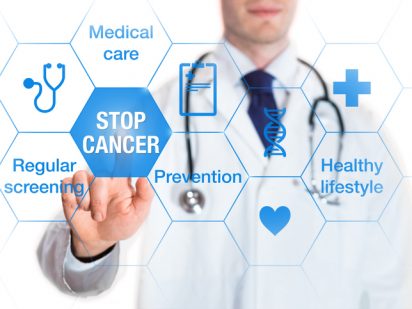Cancer is among the leading causes of death worldwide, the Mayo Clinic reports. In 2018, an estimated 1,735,350 new cases of cancer were diagnosed in the United States, with 609,640 deaths.
However, only five percent of cancers are hereditary, while non-inherited causes of cancer, such as lifestyle choices, have a direct impact on overall cancer risk, the Prevent Cancer Foundation said on its website. Early detection and treatment are also important components of cancer prevention.
The best ways to prevent cancer include:
1) Don’t use tobacco.
Tobacco use causes cancer throughout the body, so understandably, tobacco cessation can help aid prevention. If you don’t smoke or use tobacco, don’t start; and if you do smoke or use tobacco, quit, the Centers for Disease Control and Prevention(CDC) advises.
2) Eat a healthy diet.
According to the National Foundation for Cancer Research, approximately 30 to 40 percent of cancer diagnoses could be prevented by a modest diet and lifestyle changes. In cases like stomach cancer, this increases to 90 percent. The presence of carcinogens in food increases cancer risk; many of these are added chemicals or additives used to preserve food, alter the food’s texture, or change the food’s appearance. A simple way to avoid these chemicals is to refrain from – or minimize – eating processed foods with ingredients that you do not recognize or that you know aren’t whole-food based.
3) Maintain a healthy weight and be physically active.
The World Cancer Research Fund estimates that about 20 percent of all cancers diagnosed in the United States are related to body fat, physical inactivity, excess alcohol consumption, and/or poor nutrition – and thus could be prevented.
4) Protect yourself from the sun.
Sunscreen is proven to decrease the risk of skin cancers and skin precancers, the Skin Cancer Foundation said. Regular daily use of SPF 15 sunscreen can reduce the risk of developing squamous cell carcinoma by about 40 percent and lower the risk of melanoma by 50 percent.
5) Get vaccinated.
Each year, about 44,000 new cases of cancer are found in parts of the body – including the cervix, vagina, vulva, penis, anus, rectum, and oropharynx – where human papillomavirus (HPV) is often found. Of these, HPV causes about 34,800 of these cancers, the CDC reports. The HPV vaccine protects against the types of HPV that most often cause these cancers.
6) Avoid risky behaviors.
Risky behaviors that lead to infections can in turn increase the risk of cancer. For example, practicing safe sex can reduce the risk of developing a sexually transmitted infection, such as HIV or HPV. According to Mayo Clinic, people who have HIV or AIDS have a higher risk of cancer of the anus, liver, and lung. HPV is more often associated with cervical cancer, but it might also increase the risk of cancer of the anus, penis, throat, vulva, and vagina.
7) Get regular medical care.
Regular self-exams and screenings (colonoscopies for colorectal cancer or mammograms for breast cancer, for example) can increase your chances of discovering cancer early, when treatment is most likely to be successful. Speak with you healthcare provider about the best cancer screening schedule for you.

